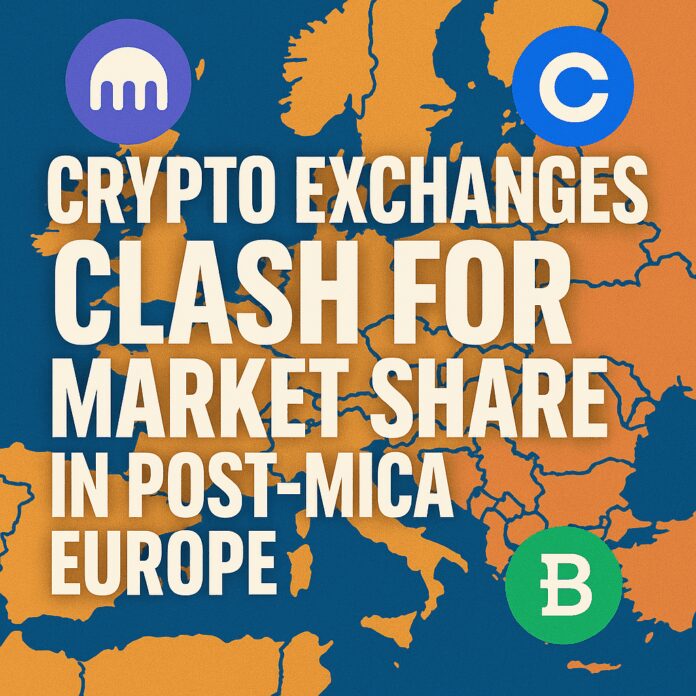Kraken, Coinbase, and Bitstamp lead the charge as MiCA draws a new battle line across the EU
MiCA unlocks the European battleground
As the Markets in Crypto-Assets Regulation (MiCA) framework begins taking effect across the EU, major crypto exchanges are accelerating their push into regulated European markets.
According to a new report from Cointelegraph, global platforms like Kraken, Coinbase, Bitstamp, and newer players like Bitpanda and Crypto.com are all racing to secure market share ahead of full MiCA enforcement in December 2025.
What’s driving the land grab?
| Driver | Description |
|---|---|
| ✅ MiCA clarity | MiCA brings uniform rules to all 27 EU states—ending years of regulatory patchwork. |
| 🔐 License requirement | Crypto exchanges must register as CASPs (Crypto Asset Service Providers) to continue operating legally. |
| 🪙 Stablecoin restrictions | Only regulated issuers may offer stablecoins under MiCA—cutting off unlicensed competitors. |
| 🌍 EU passporting | Once licensed in one country, firms can operate across the EU without reapplying. |
This framework creates a race for first-mover advantage—and a wave of consolidation is likely to follow.
Kraken and Coinbase lead the way
Kraken has already secured VASP registrations in Ireland, Spain, and the Netherlands, with its EU headquarters in Dublin. Earlier this year, it was granted a full VASP licence in Ireland, seen as one of the EU’s most rigorous regulators.
Coinbase, meanwhile, is leveraging its MiCA-ready licence from Germany’s BaFin and recently won approval in France to operate as a PSAN (digital asset service provider).
Both platforms are investing heavily in compliance infrastructure, local hiring, and direct regulatory engagement.
Bitstamp, Crypto.com, Bitpanda close in
Bitstamp, one of Europe’s oldest exchanges, has retained strong market share in France, Italy, and the Benelux region, positioning itself as the “bank-friendly” exchange.
Crypto.com received a full registration in the Netherlands and is targeting retail users with euro-denominated products.
Bitpanda, headquartered in Vienna, is leveraging its MiFID II investment firm licence to merge crypto and stock trading—becoming a hybrid neobroker.
New winners—and losers—ahead
As MiCA implementation ramps up:
- Unlicensed exchanges will be forced to exit
- Brokers and fintechs without crypto capabilities may look to acquire licensed CASPs
- Regulatory arbitrage between Estonia, Cyprus, and Lithuania will fade
- Customer trust may shift toward regulated, EU-based platforms
Exchanges that combine licensing, scale, and UX are likely to dominate in a post-MiCA Europe.
Bottom line
MiCA is doing what crypto hasn’t seen before: leveling the playing field. In the new EU landscape, being fast isn’t enough—you need to be licensed, local, and locked in.
The great crypto exchange showdown in Europe has begun—and only the most compliant will survive.




